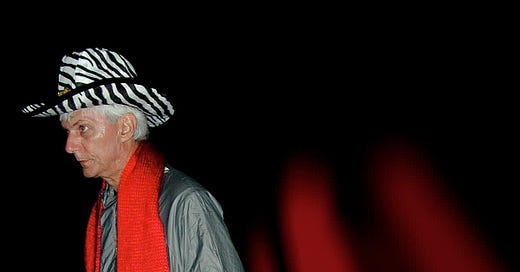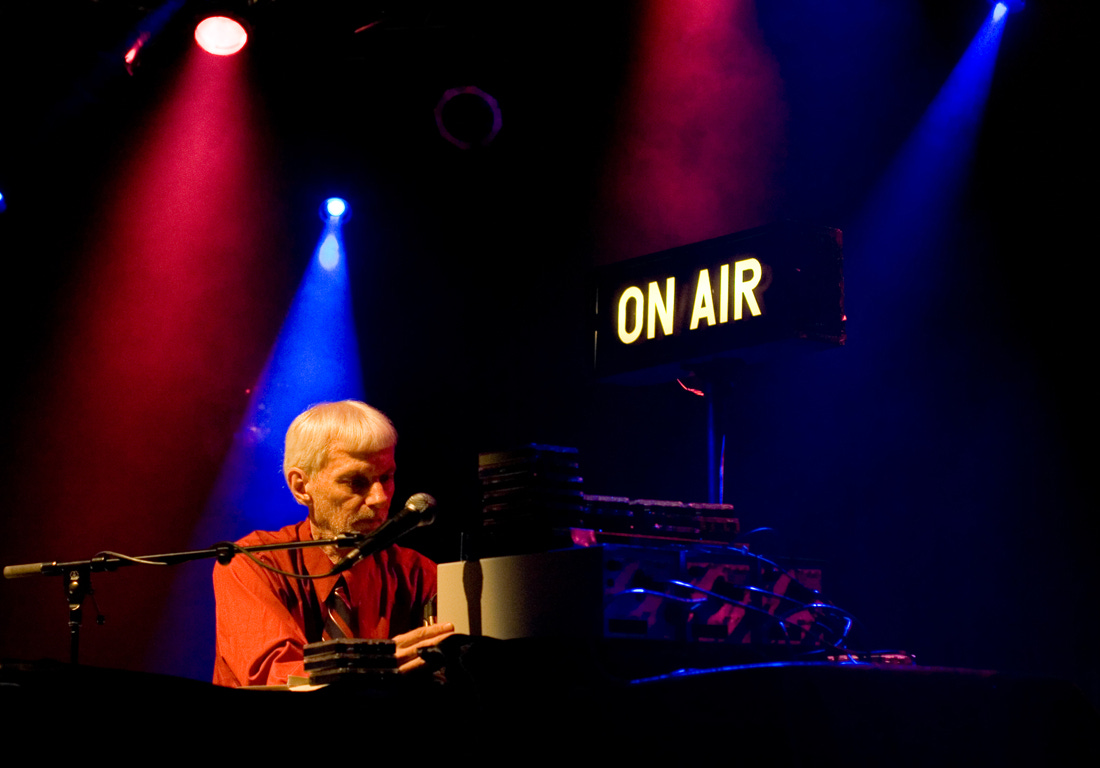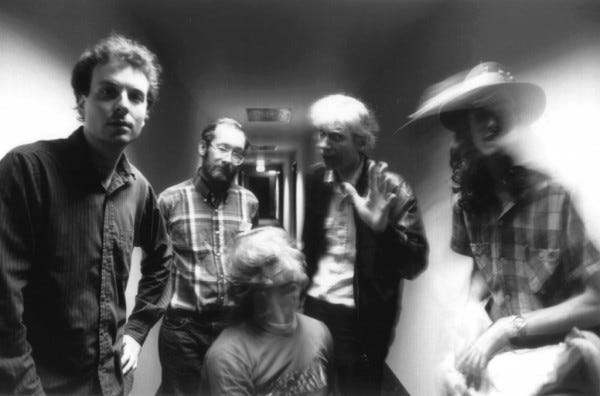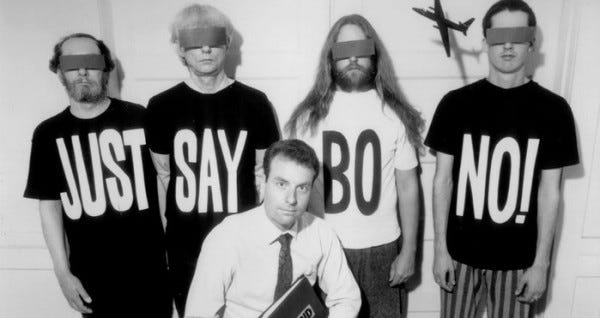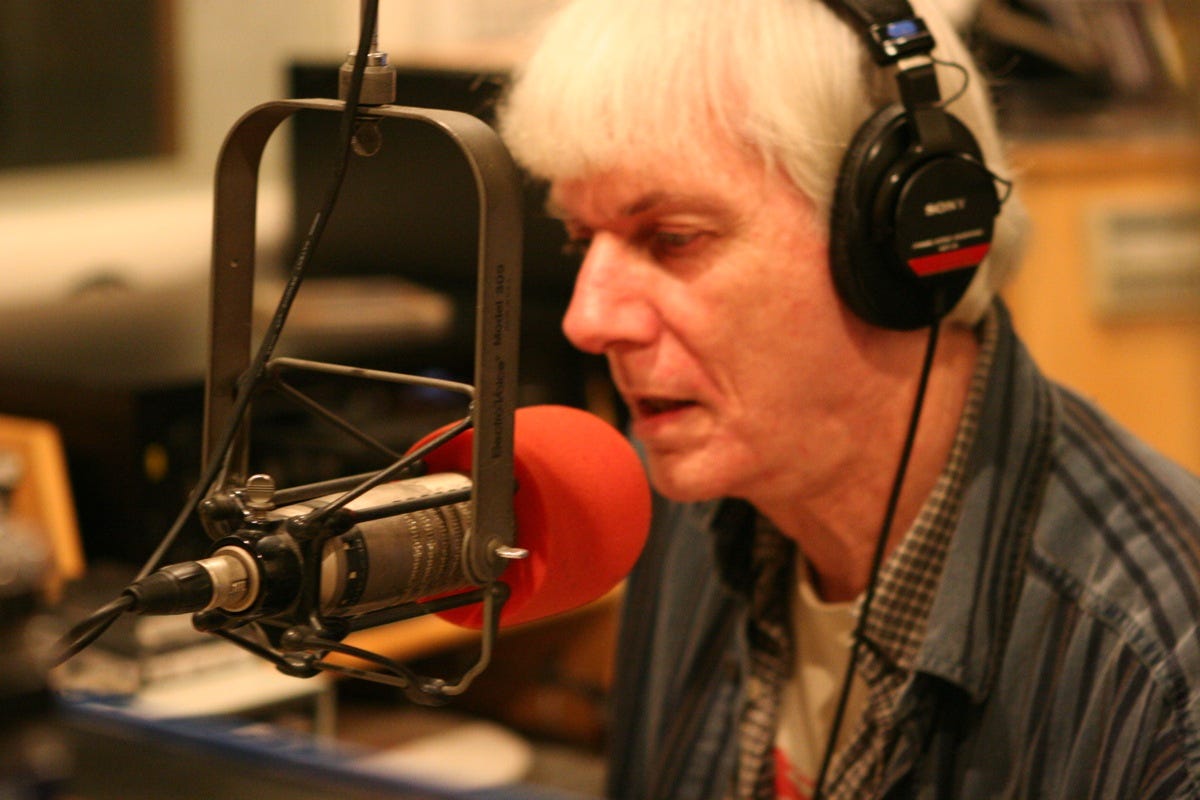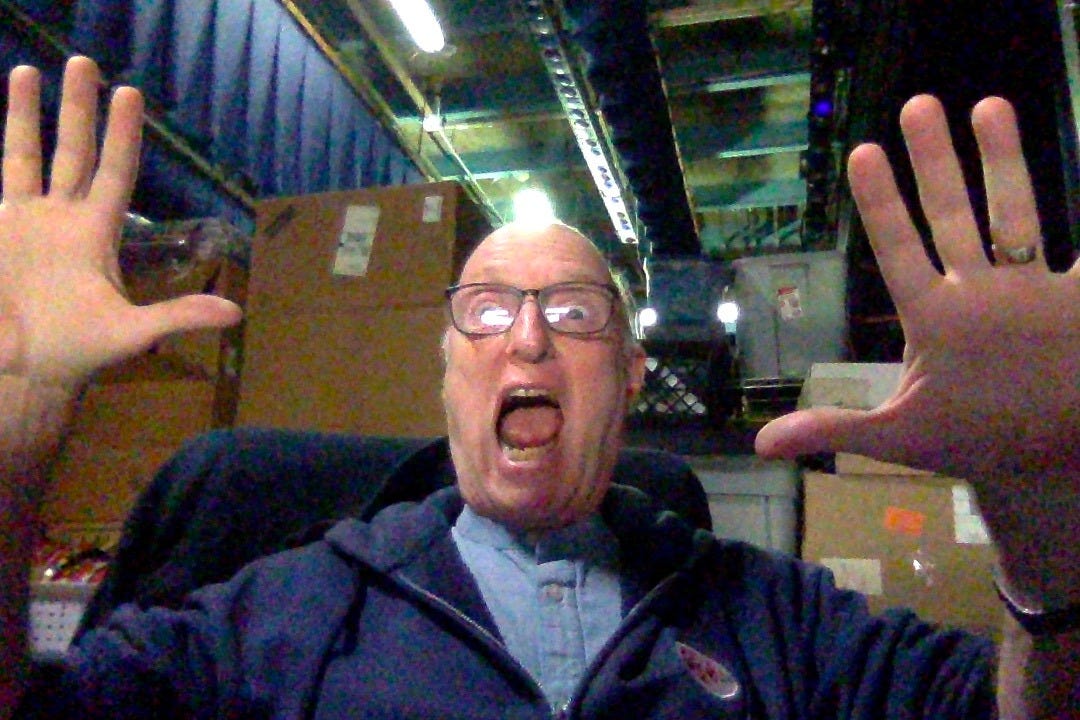February 9, 1944: Don Joyce, Keene, New Hampshire, Negativland; Bob Goldberg
Not to imply that New Hampshire is in the state of Negativland...
Don Joyce, 1944 Keene, New Hampshire
Don Joyce was one of the founders of Negativland and we lost him way too early, though there is a quite nice obit that follows below that gives you a great overview (and links to discovering his stuff).
Negativland only appeared once at the New Music Americas, but as the packed audience at the Knitting Factory proved, they were quite well known among us who had been listening to them ever since the early days of Escape from Noise. That album was part of the concert, as well as the suite from Helter Stupid, the document/documentary of how they were able to fool a California tv station (and several other news outlets that were lazy in fact checking) that their track Christianity is Stupid, Communism is Good had caused a mass ax murdering. This was in the midst of the First American Culture Wars (that’s what led to the Senate hearings and Laurie Anderson’s defense of 2Live Crew with “I will defend your right to be assholes” or something to that nature…)
I was able to capture this concert, though I’m pretty sure there is a closing part somewhere in which I lost my voice singing/screaming along to the word/refrain Car Bomb!
Negativland in NYC at the Knitting Factory, November 16, 1989 Part 1:
Part 2:
* Review
A ghost in the machine, a Negativeland (sic) shadow cast over culture in pockets of obscurity where the owners of the space were allowed to designate their own programming.
- Ear Magazine, February 1990 "exquisite corpse" method of reviews of the festival, in which the end of one's thoughts become the beginnings of another's - unless of course they're separated as they are here.
*
The news this past Thursday morning that Oakland resident Don Joyce, founder and host for 34 years of Berkeley radio station KPFA’s experimental Thursday late night show “Over the Edge” and one of the core members of the Contra Costa-founded music collective Negativland, passed from heart failure at the age of 71 comes as an unwelcome shock.
Announced by the band via a lengthy, heartfelt and celebratory Facebook post, saluting Joyce as “[c]ranky, curmudgeonly, loyal and fair, brilliant, hilarious and uncompromising, [and] steadfastly devoted to the creation of his art,” it’s the second loss this year suffered by Negativland, following the January passing of founding member Ian Allen, who himself originally introduced Joyce to the group.
Joyce’s role with Negativland was, almost, a bit like Robert Hunter’s has been for the Grateful Dead over the decades — someone who wasn’t there as the band first came together, but who provided the group with some of its core identity and sensibility very early on through to the present.
Unlike Hunter’s offstage role as regular lyricist for the Dead, Joyce was a full performer and credited member, though his stewarding of the “Over the Edge” program was a specific pursuit he had started separately before meeting Negativland.
The show was not the band, nor vice versa, but the fusion of the original line-up’s interest in found sound, collage and moving beyond music as such with Joyce’s own full passions in those areas meantime a multiplication of possibilities all around.
While innumerable routines, compositions and early versions of what became final Negativland albums were workshopped on “Over the Edge,” Joyce remained the central DJ figure and sole constant show-by-show performer.
He often took on various roles in what could almost become a weekly series of playlets, all while maintaining a running flow of music snippets, film clips, news broadcasts and much more from KPFA’s resources, his own self-created archive and much more. Negativland’s remembrance noted Joyce’s love for both Bob and Ray routines and the Firesign Theatre’s own famed experiments in sound as well as a deep understanding and appreciation of radio drama, both audible influences on his creative work.
It’s easy to see how from the start of “Over the Edge” in 1981 Joyce stood apart from the crowd at a time when TV had fully taken over from radio as the main cultural medium, with cable TV about to upend things even further.
At a time when podcasts receive so much attention in combination with the principle of creatively striking out on one’s own, free from outside interference, it’s clear now Joyce was a near-lonesome pioneer, keeping the promise of freeform radio as such alive in a unique fashion — even more remarkable when the tools to hand were strictly analog, tape cartridges and hands-on manipulation rather than laptops and ready-made software.
A growing number of DJs in turn — especially at college radio, where Negativland slowly but steadily built its initial reputation throughout the 80s — were inspired by “Over the Edge”; the band eventually began releasing tapes of certain famed broadcasts, while many more circulated thanks to dedicated Bay Area listeners taping copies and dubbing them out for friends well beyond the listening range.
Meantime, Joyce himself became one of the key public figures of the group along with founders Mark Hosler and Richard Lyons as well as David Wills aka the Weatherman, as well as featuring in works such as Craig Baldwin’s 1995 documentary “Sonic Outlaws,” with clips of an “Over the Edge” broadcast as it happened.
Seeing Joyce on the road during Negativland’s rare tours, working with a stripped down version of his radio setup to create and reconfigure the band’s underground hits — perhaps most famously and notoriously, their repurposing of U2’s “I Still Haven’t Found What I’m Looking For” — was just as thrilling in its own right as watching someone pull off a notable sax improvisation or a drum solo would be in other contexts, a demonstration of skill at work that also aimed to entertain.
The band’s short 2005 It’s All In Your Head tour was specifically conceived and presented as an audio-only event, an extension of “Over the Edge” in a live setting that worked just as memorably as their full audio/visual presentations.
Joyce also brought in a particular passion for the theoretical aspects of what Negativland did, and often voiced them through the lens of one of his most famous creations: Crosley Bendix, cultural commentator of the purported Universal Media Netweb.
Whether it was the surreal humor of his announcement of a new fourth primary color — squant, which possessed its own scent — or his early musings on culture jamming, putting a term to the repurposing and undermining of mass media broadcasts that Joyce and the band regularly pursued, Bendix gave a voice to OTE, a bit of strange serenity amid the flowing sound.
At this point in the article, there is a video which can’t be reproduced here, so you can get it by going to the above link.
In contrast was another demi-regular character, Universal Media Netweb founder C. Elliott Friday, a supposed tycoon living in isolation in the South Pacific who bombastically ran for President every four years — Donald Trump only wishes he was as funny.
Joyce didn’t simply incorporate Negativland’s work into the broadcasts, but those of his listeners as well, in much the same way as the current cult favorite “The Best Show,” hosted by Tom Scharpling and Jon Wurster, takes in contributions from its own regular fanbase, via humor or remembrances of interest.
Joyce encouraged audience participation by what he termed “receptacle programming,” inviting those similarly inclined to call in and create sonic disruptions of any sort or add commentary to the proceedings, for as long as Joyce felt any particular call was worth keeping — he directed whoever called to be ready to participate as soon as he picked up the phone. It was an extra element of the unexpected, all while Joyce had his own standby elements for the show — his opening theme music “12 O’Clock (in two parts)” by Vangelis, a closing recording of the Man Ray-attributed statement “To create is divine. To reproduce is human,” among others.
Even those elements were up for reworkings and destabilizing, not to mention the length of each broadcast itself, helping underscore Joyce’s point that everything could be turned into something else — to, indeed, reproduce, in different ways.
It’s right to conclude by noting two pieces that Joyce created which Negativland cited in its remembrance — “Time Zones” from 1987’s Escape from Noise, a wonderful vivisection of late Cold War paranoia, and “Piece of Pie” from 2005’s No Business,” turning a bit of radio film noir into a combination of Moebius time-loop theory and Kafkaesque confusion.
It’s just a small sample of the creativity of Joyce brought to life — and with Negativland’s further announcement in its memorial that the entire 34 year run of “Over the Edge” will be available later this year on the Internet Archive, it’s a welcome sign that while he is gone, his work happily lives on.
- Ned Raggett, SF Gate
https://archive.org/search?query=creator%3A%22Over+the+Edge%22
The track originally named Christianity is Stupid (Communism is Good) got a reworking, I presume in tribute to Saint Mel, and incorporated in this 2004 video named The Mashin of the Christ
The aforementioned Helter Stupid, the document/documentary about their poking the Culture Wars Bear, is detailed here:
https://en.wikipedia.org/wiki/Helter_Stupid
And finally, the suite which was also performed at the Knitting Factory:
I would be remiss to forget to mention that Negativland is still creating and touring, and there’s even been a new document released about their recent adventures with live visual artist Sue-C and their various well-masked in person tours and occasional online shows during the second year of COVID:
And this documentary about the band itself has been making its way through cinema arthouses and galleries over the last year or so:
Which allows you to get to their own portal for details about this and other projects:
https://negativland.com/negativland-documentary
Last, but definitely not least, as mentioned in the obit above, the archives of the weekly series hosted by Don Joyce on KPDA, Over the Edge, are now available on the archive.org website at this link - 178 programs that go all the way back to 1981 (which was incidentally/not incidentally the year New Music America came to San Francisco).
https://en.wikipedia.org/wiki/Over_the_Edge_(radio_program)
https://archive.org/search?query=creator%3A%22Over+the+Edge%22
♪
Bob Goldberg
One of the (few) benefits of Facebook is that you get another way of finding out someone’s birthday, but in my case it was a half hour before this got posted, but still it’s on time and deliverable! But for Bob, whose recording I held on for more than thirty years before being able to deliver what he had asked of me in Philadelphia in 1987, we’ll leave blanks to fill in (if necessary) date and location!
Though he and his composition was only featured once, at the 1987 Philadelphia festival, it was nonetheless a grand occasion and apparently I was the only one with a recorder able to capture his Relâche-in-a-Parking-Garage masterwork, Music for Subways. You’ll find at this link both downloadable Soundcloud versions as well as the nicer ones that Substack allows me to post. Happy birthday, Bob!
(Oct 29) NMA Philadelphia 1987: installations and other sound creating devices
As with the other festivals, at New Music America 1987 in Philadelphia, the visual arts got a bit of short shrift when it came to media coverage - well, maybe not Alvin Curran but that was a hard one to avoid! But these traces of great works remain…
(another benefit of being a facebook friend is the photography…)

